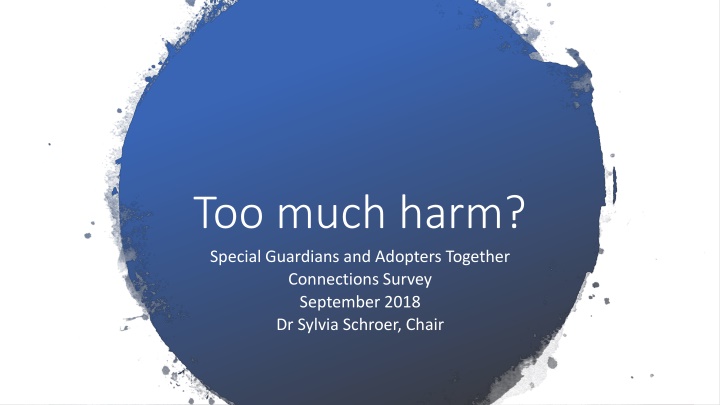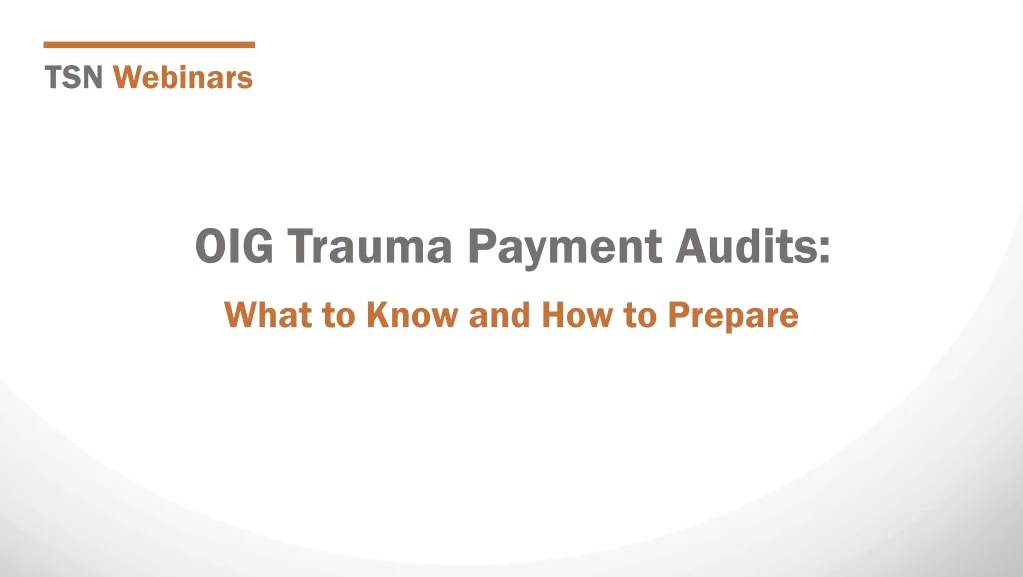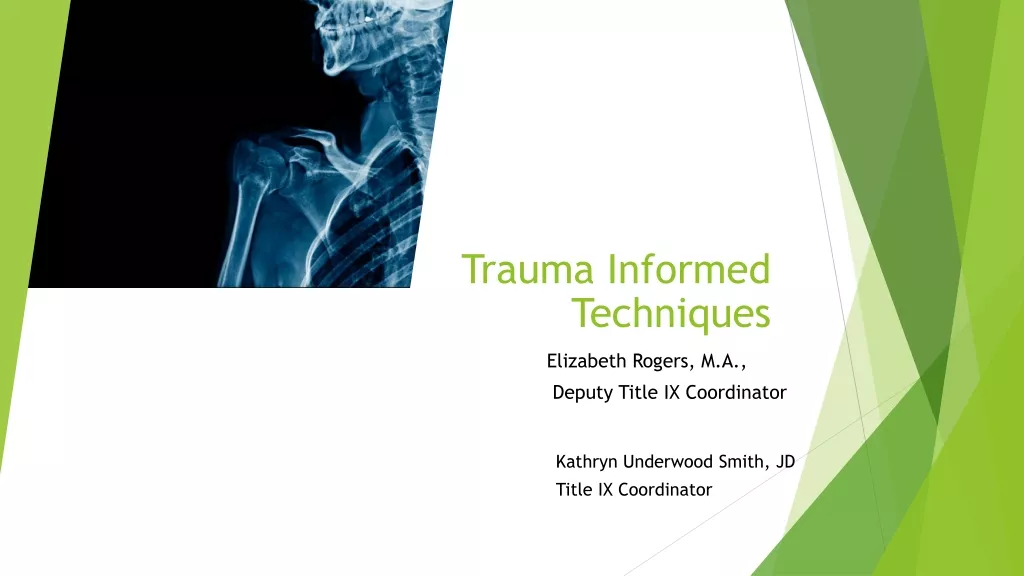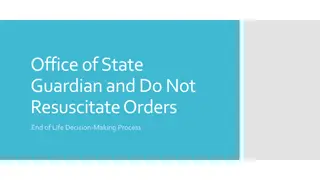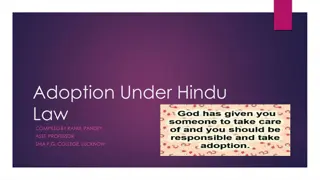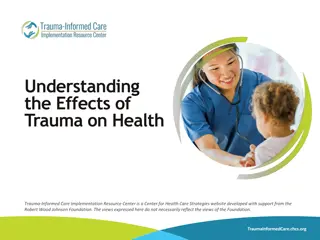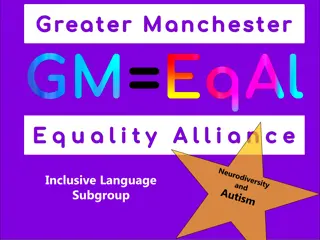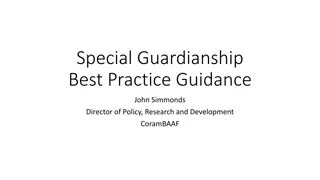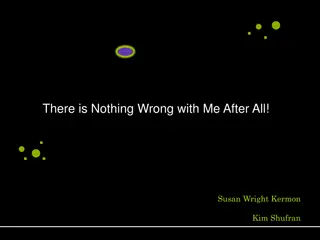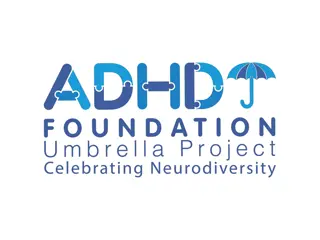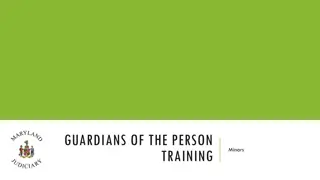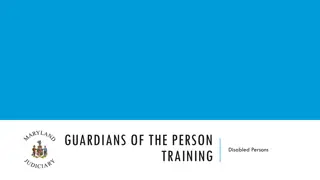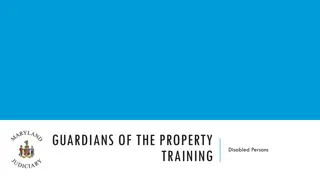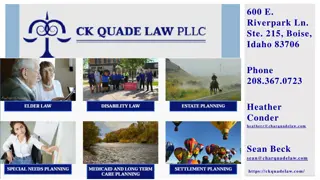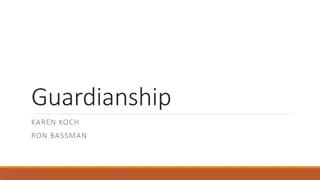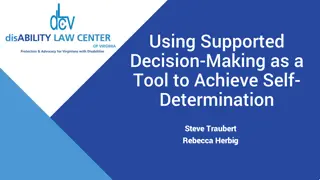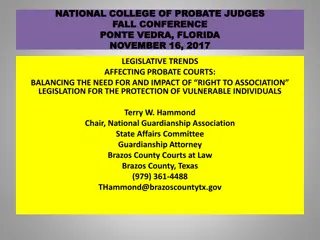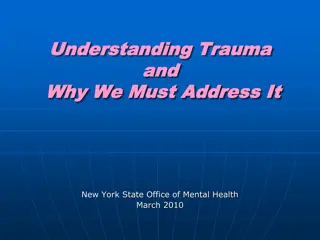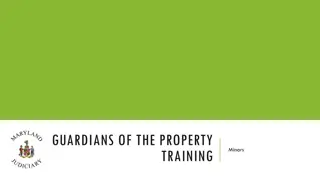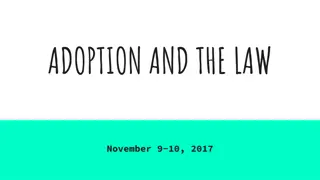Insights on Trauma and Neurodiversity in Special Guardianship and Adoption
Exploring the intersection of trauma and neurodiversity in the context of special guardianship and adoption, this article highlights the challenges faced by families and children, emphasizing the need for connection, integration, and understanding. Addressing emotional harm caused by the system, it advocates for a supportive and inclusive approach to healing and caregiving. The discussion also touches on intergenerational trauma, epigenetics, and the importance of language in shaping perceptions and experiences.
Download Presentation

Please find below an Image/Link to download the presentation.
The content on the website is provided AS IS for your information and personal use only. It may not be sold, licensed, or shared on other websites without obtaining consent from the author.If you encounter any issues during the download, it is possible that the publisher has removed the file from their server.
You are allowed to download the files provided on this website for personal or commercial use, subject to the condition that they are used lawfully. All files are the property of their respective owners.
The content on the website is provided AS IS for your information and personal use only. It may not be sold, licensed, or shared on other websites without obtaining consent from the author.
E N D
Presentation Transcript
Too much harm? Special Guardians and Adopters Together Connections Survey September 2018 Dr Sylvia Schroer, Chair
Peer supported campaigning group 100+ members We ask Qs not being asked by researchers: 3 Surveys involving 700 respondents and 1000+ children Telling it like it is Thought, discussion and dialogue Kindness ethos from POTATO Learning from each other. Listening to each other Respecting the perspectives of all stakeholders and working together About SG&AT
We are linked through our children WE ARE CONNECTED but we have a divisive system. This needs to change To heal our children need connection & INTEGRATION 3 areas of brain affected in Developmental Trauma are all to do with integration Group members were clear that they wanted to look at Emotional Harm from a wider perspective and include the emotional harm caused by the system. Why call it the Connections Survey?
Neurodiversity conditions and Mental Health Diagnoses FASD, Autism, PDA, Attachment Disorder, Developmental Trauma, PTSD, ADHD See our previous surveys for comparative data for adopters/SGs Intergenerational impact of trauma Epigenetics. Can take more than one generation to heal Sometimes, sadly, our children must re- enter care we cannot contain the trauma safely, especially with services under pressure. Trauma affects family life and us 11% adopters/SGs diagnosed with PTSD in Health and Well Being Survey. We can do better! We are families at risk
We say re-enter care this is a reminder of child s previous separation trauma, and their vulnerablity. Disruption (post AO) is technically incorrect when an AO cannot be revoked. Failure and Breakdown are loaded terms. The language of blame. Placement implies impermanence. We are real families. Language is important We have enough on our plates without loaded terminology. Parenting a traumatised child or YP is possibly the hardest job anyone could ever do try it for a week!
http://acornsnetwork.org.uk/2018/02/findings-looked-children-autism-released/http://acornsnetwork.org.uk/2018/02/findings-looked-children-autism-released/ http://acornsnetwork.org.uk/2018/02/findings- looked-children-autism-released/ http://acornsnetwork.org.uk/2018/02/findings-looked-children-autism-released/ A birth mother that we work with found: Autism rates for LAC children (0-13%) - average 3% We fight for the child - for recognition of child s needs & difficulties Manchester study of 60 domestically adopted children found 10% prevalence of autism and a further 17% of children who showed significant autistic traits. (Green et al, 2016)
Feedback sought/given on questions asked from group members, Sarah Phillimore, Prof Anna Gupta, Back from the Brink Piloted on the group Promoted on social media Ran for 2 weeks in August 2018 Anonymous Survey. All Q s voluntary. Took 11 minutes to do Connections Survey How was it done?
76 Adopters; 89 SGs; 18 KCs (with no SGO). Respondents parented and cared for 280+ children: 128 Adopted children, 140 SGship children and 22 KC children. Connections Survey Who took part? More than 90% of respondents were women More relatives of birth mothers than birth fathers took part (SGs=38% vs 28%; KCs=44% vs 11%) Separation from siblings was similar for different groups (A=21%; SGs=17%; KCs=23%)
Adopters are usually more affluent. More adopters have household income of 40k plus (A=49% SGs=9%, KCs=13%). More SGs and KCs have 20k or less (A=16%, SGs 48%, KCs=87%) More SGs and KCs are single parents (A=16%, SGs=31%, KCs=40%) More Adopters parent 2 or more previously LAC child than SGs (A= 56% 2+ children, SGs=41% 2+children) SGs and KCs care for more children overall blended families . Figures for families with 3+ children are A=18%, SG=42%, KCs=33%) What were the differences between adopters, SGs and KC families?
Age of child when came to live in family (% of total children in survey) 12-15years How old were children at placement? 8-11yrs 4-7yrs 12months-3yrs less than 12 months 0% 10% 20% 30% 40% KCs N=19 SGs N=108 Adopters N=103
12 Adopters were told adoption was consensual, 32 were informed it was non consensual and 5 adopters said they didn t know What were adopters told? 36 Adopters reported they were told that the suitability of family members was considered/assessed, 10 were not informed about this
Respondents understanding about reasons for child s removal - % of total children for respondent group 120% 100% Respondents understanding of why children were removed? 80% 60% 40% 20% 0% Adopters N=128 SGs N=140 KCs N=22
Birth Parents Mental Health and Experiences Died Care Experienced Mental health and experiences of birth parents Abuse Survivor Terminally Ill Physical Health Issues Other Mental Health Learning Disability Schizophrenia Personality Disorder BiPolar Depression/Anxiety 0 10 20 30 40 50 60 70 Adopters N=109 SGs N=138 KCs N=17
Birth parents health and suffering after removal of child 60.00 50.00 What happened to birth parents after child s removal? 40.00 30.00 20.00 10.00 0.00 Adopters N=113 SGs N=124 KCs N=19
Support given to Birth Parents after child's removal Don't know/not informed Support given to birth parents after child s removal No support Given by Charity/other Given by LA 0.00 10.00 20.00 30.00 40.00 50.00 60.00 Adopters N=53 SGs N=60 KCs N=9
28 Adopters provided comments. Adopters were well informed about impact of trauma expert parents adopters receive more training Separating the trauma of loss of relationships from trauma of abuse/neglect was impossible Removal itself was traumatic What adopters say about the impact of removal on child?
The impact is unimaginable. The children feel anxious and threatened but cannot understand or articulate why. The children feel lost and abandoned and unsafe, even when the adoptive home is a safe place . The children are deeply misunderstood. They are seen as difficult and defiant. They are in emotional turmoil. It is almost impossible to see when this gets better for the child. Until they can learn to trust others and confide, they are trapped Adopters on the impact of removal on child
Traumatic for the older one who was six and a half when she was removed from Birth mother to go into foster care but maintains she wasn't told where she was going by SW apart from being told they were taking her to MacDonalds, but then never went home. Remembers birth mother crying at the window of their flat Adopters on the impact of removal on child
44 SGs described a range of diverse experiences. Observed that better support should have been given before removal Brothers and sisters could respond very differently and SGs attributed this to their different experiences. Continuity of care was considered beneficial tried to keep children out of foster care Responses of children were complex, puzzling and unpredictable What special guardians say about impact of removal on child
Emotional/psychological issues before/after contact, massive impact of being only child removed with the four born since (starting less than a year after SGO granted) remaining with birth mother with no SS involvement. Definitely a case where so much better if SS had supported birth mum instead of removing child Special guardians on impact of removal on child I have had little one since she was 3 days old but she has possible attachment issues
Our sg children are brother and sister but we re also separated from another brother. The oldest was 10 when he came to us and it seems he is old enough to appreciate what we have done for him. It has been harder on the youngest who was 2 when she came to us and holds a lot of resentment towards us all (even though she is so young) Special guardians on impact of removal on child
Our daughter suffered severe PND after her fourth child was born. It didn t matter how often and how bad things were no one would listen to us until it was too late. Eight months after we took the children in our daughter died. The children lost their mum and we lost our daughter who we had really lost months prior. SS didn t offer counselling and it was the undertaker who suggested a Nelsons Journey for the children, as for us our hearts are broken for ever Special guardians on impact of removal on child
5 Kinship Carers provided comments: The child was too young to remember living with her birth mother and had never really formed much of an attachment to her Kinship Carers on impact of removal on child Extremely upset mostly about missing mum Attachment issues, abandonment issues, trust issues
Satisfaction with support overall Poor support/understanding Patchy Respondents views about support for our families support/understanding Good support/understanding overall Excellent support/understanding 0% 10% 20% 30% 40% 50% KCs N=4 SGs N=59 Adopters N=45
Only 2/41 respondents had good partnership working Partnership working after child re-entered care 20 15 10 5 0 Adopters SGs KCs
Child going back into care does not remove the child s problems: Our daughter removed herself initially, due to mental health and identity issues which became more complex when she re entered care. She has lived in 5 different places as well as times back home since she re entered care. Her behaviour and psychological problems have worsened significantly (overdoses, self harm, absconding, shoplifting, CSE claims) and her struggles with identity have worsened What happened when adopted child re-entered care?
Separation not support It was terrible .My son tried to take his own life twice in care and self harmed continually. He was in residential care as no foster carers could be found who would take him on. He wanted to come home for three and a half years but no dialogue about it was achievable What happened when adopted child re-entered care? confusion and trauma and foster care is all he knows and he had many moves, schools, exclusions, all in foster care
Separation not Support I have made several complaints about the way the local authority deal with my daughter's care. I have received acknowledgement and apology for this but still nothing has changed. The LG Ombudsman is about to initiate a complaint on behalf of my daughter. I feel demonised by many professionals and do not trust them at all Partnership working after child re- entered care
Separation not support They have offered no support to us as parents to help keep the family together but have only focused on our daughter's rights and "moving the case along". They have taken a wholly adversarial approach at formal meetings. We have had to make complaints to ensure action is taken in our daughter's best interests. We have been ignored and misrepresented Partnership working after child re- entered care
Has the term 'emotional harm' ever been explained to you? 35 Has Emotional Harm ever been explained to you? 30 25 20 15 10 5 0 Adopters N=47 SGs N=58 KCs N=8 Yes No
How clear are you about meaning of term from a legal perspective? How clear respondents felt about term EH from a legal perspective Not clear Have an idea but feel unclear Clear about meaning 0 10 20 30 40 50 60 Adopters N=47 SGs N=58 KCs N=8
Professionals struggle to build trust with our children but child gets blamed: child did not engage Our knowledge of our child is not valued/respected Selectivity about child s wishes & feelings Assessment not assistance. When help seeking leads to judgment then help is not sought. Nearly 40% avoided speaking to GP for fear of repercussions Intervention can come between us and our children Best interests principle used to justify Cases are not taken back to court by IROs Lack of accountability and far too many formal complaints - 38% had made a complaint in Health and WB Survey. Nothing happens Courts are not problem solving, can only persuade no transparency if LA don t contest application no judgment to publish No models for reunification exist for our families the knowledge of HOW to support us appears lacking, Child just sent home Thoughts about some systemic problems
Conclusion: Families need Holistic Family Centred Support especially ours!
Change 1989 Children Act - Petition to Parliament Lack of LAC - Change.org Please support our Petitions Regulate financial assistance for Special Guardians 38 Degrees Bring in new laws for to support children and families that struggle because of the child s past 38 Degrees
Website: www.specialguardiansandadopterstogether.com Website: Website: www.specialguardiansandadopterstogether.com www.specialguardiansandadopterstogether.com Stay Connected sgandadopterstogether@gmail.com Email: sgandadopterstogether@gmail.com Twitter: @SGandAT
